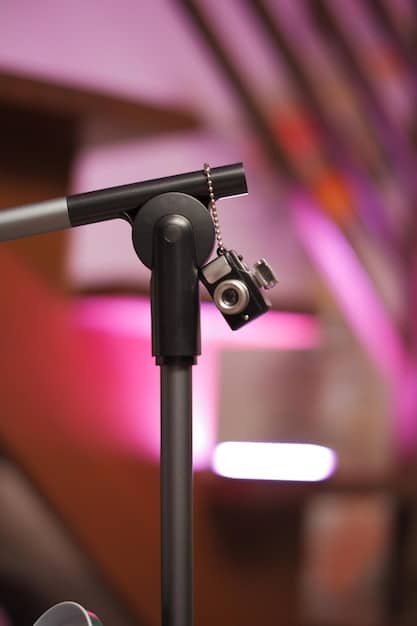Master Author Event Q&A: Engage Readers & Boost Book Sales

Author Event Q&A is more than just answering questions; it’s an opportunity to connect with readers, build your author brand, and ultimately boost book sales by creating a memorable and engaging experience.
Navigating the Q&A session at an author event can feel like walking a tightrope. But with the right preparation, an author event Q&A can transform from a nerve-wracking ordeal into a golden opportunity to connect with your audience and boost book sales. It’s your chance to shine, share insights, and leave a lasting impression.
Mastering the Art of Author Event Q&A: Why It Matters
An author event Q&A isn’t just a formality; it’s a crucial part of the author-reader connection. It’s where you, as the author, get to step out of the pages of your book and into the hearts and minds of your readers.
It’s an opportunity to foster a more profound connection with your audience and directly impact your book sales. Let’s delve into the reasons why mastering the art of Q&A is indispensable for authors.
Building a Bridge to Your Readers
A well-executed Q&A builds a bridge between you and your readers. When you address their curiosities and concerns directly, you show that you value their engagement and interest in your work.
- Demonstrates authenticity and approachability.
- Transforms readers into advocates.
- Creates a memorable experience.
Engaging with readers personally during the Q&A session helps them see the person behind the book. Establishing this human connection will solidify their affinity for your work and make them more likely to recommend it to others.
Preparing for Your Author Event Q&A: Know Your Audience
Preparation is paramount. Walking into an author event without a solid plan for the Q&A is akin to sailing a ship without a map. Understanding your audience is a key component of successful preparation.
Tailoring your responses to resonate with the people in the room can make all the difference. Knowing what to expect will allow you to craft answers that are informative and engaging.
Identifying Your Target Demographic
Researching the likely demographics of your audience will help you anticipate what their interests and questions might be. This doesn’t mean stereotyping, but rather being aware of common trends.
- Age range and interests.
- Prior knowledge of your genre.
- Motivations for attending the event.
Crafting Thoughtful Answers: Strategies and Techniques
The way you respond to questions can greatly influence the audience’s perception of both you and your book. Thoughtful answers provide value, stimulate conversation, and leave a lasting positive impression.
Mastering the techniques for crafting compelling responses is an art that can be honed with practice. Let’s explore some essential strategies.

The Power of Storytelling in Answers
Incorporating storytelling into your answers can make them more relatable and memorable. People connect with stories on a deeper level, and this can be a great way to enhance your engagement.
Sharing anecdotes from your writing process or personal life adds depth to your responses and captivates your audience. A compelling story creates intrigue and helps readers remember you and your book.
Handling Difficult Questions: Grace and Professionalism
No matter how well-prepared you are, you may encounter challenging or awkward questions. Handling such situations with grace and professionalism is crucial to maintaining a positive image.
Remember that every question, even a tough one, is an opportunity to demonstrate your poise and expertise. The way you handle difficult questions can define your reputation as an author.
- Stay calm and composed.
- Acknowledge the question without defensiveness.
- Provide a polite and professional response.
Utilizing Body Language: Non-Verbal Communication
Body language plays a vital role in communication. It can either enhance or undermine your message. Being mindful of your non-verbal cues ensures that you convey confidence and sincerity.
Maintaining eye contact, using open gestures, and adopting a relaxed posture can significantly improve your connection with the audience. Body language is an essential component of effective communication.

The Impact of Eye Contact
Maintaining eye contact is one of the most effective ways to connect with your audience. It shows that you are engaged, sincere, and confident. Distribute your gaze evenly among the attendees to make everyone feel included.
Avoid staring at one person or looking down, as this can be interpreted as disinterest or nervousness. Direct eye contact builds trust and enhances your credibility.
Following Up After the Event: Keeping the Connection Alive
The author event doesn’t end when you leave the venue. Following up after the event is essential for maintaining the connections you’ve made and reinforcing your author brand.
Engaging with attendees online and providing additional content can extend the positive impact of your Q&A session. Let’s discuss how to keep the connection alive.
- Share photos and videos from the event on social media.
- Respond to comments and messages from attendees.
- Offer a free download or exclusive content for those who attended.
The key to keeping the connection alive is consistent engagement and providing value to your audience. By staying in touch and offering valuable content, you can transform casual attendees into loyal fans.
| Key Element | Brief Description |
|---|---|
| 🎤 Question Preparation | Anticipate common questions related to your book and genre. |
| 🗣️ Engaging Answers | Use storytelling and relatable anecdotes in your responses. |
| 🤔 Handling Difficult Questions | Stay calm, acknowledge the question, and respond professionally. |
| 🤝 Follow-Up | Engage with attendees post-event on social media. |
Frequently Asked Questions
▼
Anticipate potential questions by thinking about your book’s themes, characters, and your writing process. Prepare talking points for each, and practice delivering them concisely.
▼
It’s okay to admit you don’t know. You can say something like, “That’s a great question, and honestly, I’m not sure, but I’ll look into it.” Then, follow up with the person after the event.
▼
Use storytelling and relatable anecdotes. Share personal experiences, use humor when appropriate, and always try to connect your answers back to your book and its themes.
▼
Stay calm and professional. Acknowledge the question without getting defensive. You can politely decline to answer or redirect the conversation to a more appropriate topic.
▼
Body language is crucial. Maintain eye contact, use open gestures, and adopt a relaxed posture. Your non-verbal cues should convey confidence, sincerity, and engagement with the audience.
Conclusion
Mastering the author event Q&A is an art that combines preparation, authenticity, and engagement. By understanding your audience, crafting thoughtful responses, and maintaining professionalism, you can create memorable experiences that resonate with readers and boost your book sales, ultimately turning attendees into lifelong fans.




![Author Spotlight: [Author's Name]'s Top 3 Writing Tips for 2025 Author Spotlight: [Author's Name]'s Top 3 Writing Tips for 2025 - Cover Image](https://noveltiesnew.com/wp-content/uploads/2025/06/noveltiesnew.com_3_1750099356_ebf5848c_cover-360x180.jpg)
